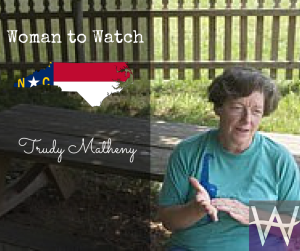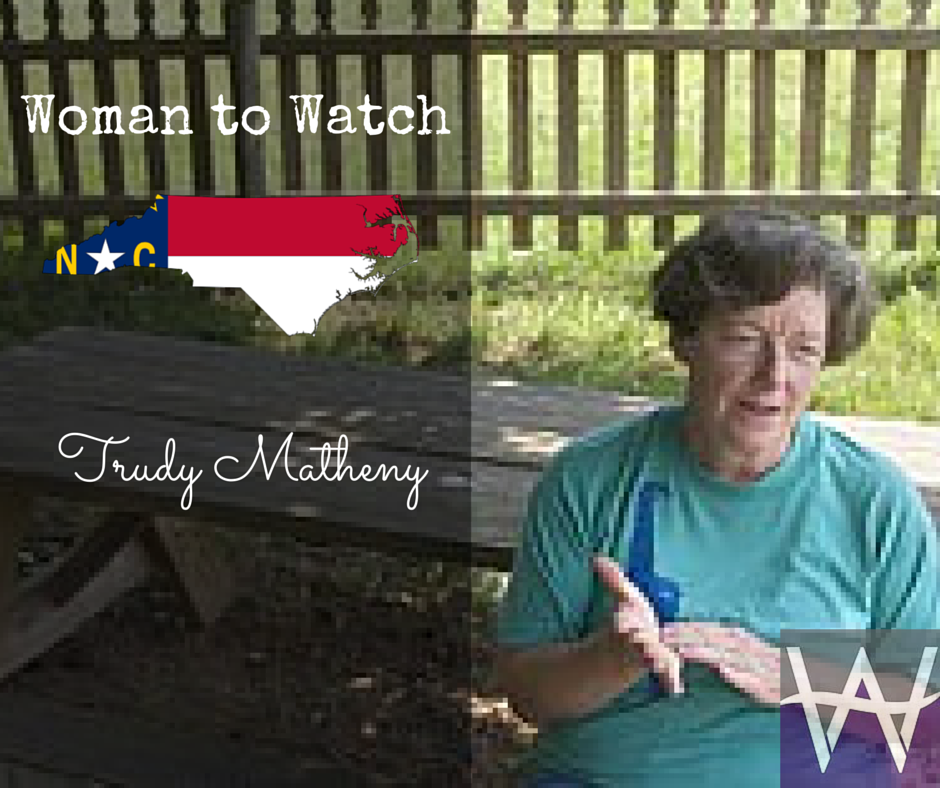>> BY CLARA FEMIA Dr. Trudy Matheny grew up in rural North Carolina on an acre of land, most of which her father planted as a garden each summer. There were more tomatoes than she and her two parents could have possibly consumed, and corn grew tall alongside them. When she asked her father why he grew so much when he couldn’t eat it all, he answered, “I just like watching them grow.”
BY CLARA FEMIA Dr. Trudy Matheny grew up in rural North Carolina on an acre of land, most of which her father planted as a garden each summer. There were more tomatoes than she and her two parents could have possibly consumed, and corn grew tall alongside them. When she asked her father why he grew so much when he couldn’t eat it all, he answered, “I just like watching them grow.”
Matheny has lived on the same farm in Chapel Hill since she first came to the area for her PhD studies at UNC. Her front yard doubles as a chicken yard, a garden, and extends into a pasture makes it clear she proudly takes after her father.
The retired Wake Tech, Elon, and NCCU Biology Professor has planted a garden everywhere she’s lived, even while getting her Master’s degree at the University of Chicago. She thinks it’s a shame how disconnected so many children and even their parents are from nature today, so she uses her own land, animals, and experience in education to do what she can to fix that. Turning her home into a non-profit, she brings children and adults alike to interact with her plants and animals and learn about farming.
Her biggest goal, however, is being a source of education and training for women who want to become farmers. With so few resources available to them in a male-dominated subculture, women come from all over the state to learn from Dr. Matheny.
Tell me about your education: After going to High Point College and University of Chicago for graduate school, I came to UNC, where I did research on primatology, and studied primates for many years. I studied sexual behaviors and how females choose males, and not the dominant male choosing females. That idea was still not accepted by many researchers.
So what was it like doing research in a controversial field?
My field director was a man who had done some research with that. When we went out I would see something very different than what he saw. He was pre-programmed to see the male, but when I would point out to him that the male and female were doing very different things, then he could see it. That gave me some insight into how people see things.
Tell me about what you do:
I started teaching college part time because I wanted to be at the farm more, and that worked great, so I started this garden. One day I said, “I want to do this full time.” So I retired, and that’s when I started thinking about it turning into a non-profit. We went from marketing and selling to turning it to being more educational. I’d see people out here with no connection to the land or animals. It was amazing and dismaying that they were so disconnected.
We focused on women farmers. I’m in the process of wanting to offer a farm school for women. They would come here and stay here for two seasons and work pretty much 24/7 and learn how to run a farm.
What made you decide to create a farm school just for women?
I saw my own experience and how I learned just from here, and if I had had a farm school my learning curve would have been a lot less steep.The practical, the business, the financial, the tax. It’s not just “grow vegetables.” The isolated women who can’t learn how to farm anywhere…women are the up and coming in farming. They are smaller scale farmers.
What does Genesis Farm do right now?
The non profit is Genesis Farm Educational Foundation. Genesis Farm is the host, where we are right now, the classes, the farm school. In the fall we’re offering a farm school for adolescent girls called Go Farm. We have a lot of volunteers and interns.
What is a pressing issue for women that you see right now, within farming?
They still can’t get assets or loans. They’re not in leadership positions so that they can make decisions about agriculture or farming. There’s a lot of emphasis these days at the state level on economic development in rural counties. Economic development to many means finding a job at a Burger King, or something like that. And I’m thinking no, we have all this fine farmland, it needs to be farmed. Women are really good at doing this small scale farming. Women farmers have increased 30% in five years but they still can’t get land, or loans, or assets.
How do we solve the farming inequity statewide?
The only way to make that change is to work with organizations across the state that can see another way for women to make a living in something that they’re good at and be an economic and social member of their community. It’s a lot more than just farming. It’s being a leader in your community. We need to be able to make decisions. That tractor out there? I can barely reach the pedal. It was designed for a man. A lot of tools are still designed for a man. Lifting a 50-pound bag of feed? I don’t need to prove that I’m strong and can lift that. That’s just always how it’s been, a traditionally male subculture. All that needs to change, little by little.
What’s one thing that you would tell young women today?
Well, one thing is that I’m so glad that your generation and the one above you are really interested in healthy food and healthy bodies and healthy land. That kind of gets left out of the equation. But there’s an emphasis on doing things the right way. I’d say plant a garden, and if you’re interested in agriculture pursue it. But pursue it in a way that’s realistic. That means you’ve got to be trained.
Is there anything else you’d like to say?
I would like to say anyone is welcome. That disconnect that I talked about, it’s so important to me. Everyone talks about kids being disconnected, but their parents are too. People have no awareness of wildlife. How do you reach people like that? What can we do here to make people more aware? I like to try to strike a balance here between the wildlife and the domestic life for animals. We have to have a balance.

Something made me research what you are doing, Trudy. I went to HPU with you many years ago. Your farm school sounds like a great idea!
Hi Trudy! I’m a blast from the past! I’m Angell Pasley. We were friends at the university of Chicago. We moved back to Virginia in 1988 and now live in Roanoke. You tried to teach me and a couple of other ladies how to play tennis. Let’s just say tennis was not my calling! I would love to hear from you.